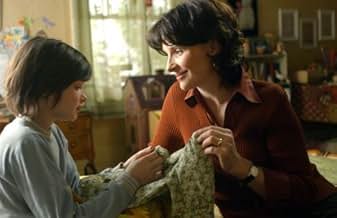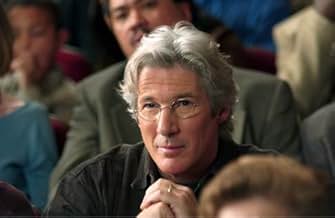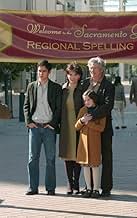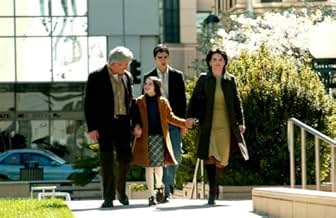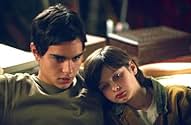Wife and mother Miriam begins a downward emotional spiral as her husband avoids their collapsing marriage by immersing himself in his 11-year-old daughter's quest to become a spelling-bee ch... Read allWife and mother Miriam begins a downward emotional spiral as her husband avoids their collapsing marriage by immersing himself in his 11-year-old daughter's quest to become a spelling-bee champion.Wife and mother Miriam begins a downward emotional spiral as her husband avoids their collapsing marriage by immersing himself in his 11-year-old daughter's quest to become a spelling-bee champion.
- Directors
- Writers
- Stars
- Awards
- 1 nomination total
- Directors
- Writers
- All cast & crew
- Production, box office & more at IMDbPro
Featured reviews
"Bee Season" co-directed by Scott McGehee and David Siegel feels empty because the somber treatment they have given to the movie. The dark cinematography of Giles Nuttgens doesn't help either, but the musical scores of Peter Nasher works well, as a whole.
One enters the Naumann world through the sensitive Eliza, a girl much older and wiser than her 11 years indicate. It is Eliza who senses all that is wrong with her family, as it appears they are falling apart in front of her, and as a little girl, she simply can't do anything at all to bring everyone together. As a way to escape the unhappy home, Eliza immerses herself in the spelling bee contests in which she excels. Not until then, does she get the attention of her father, who supports her newly found talent.
Saul, the religious studies professor, doesn't even come aware about what's wrong with his marriage until it's too late. In fact, he is a man appears to be unable to communicate with the illusive Miriam, a woman who is deeply disturbed by what happened in her own life with the tragedy of her parents death. Saul and Miriam's marriage is over, but they don't do anything to correct the situation. Miriam's problems come to a head when she is taken away and makes Saul confront the many issues that he probably never dealt with before.
Aaron, the older son, is rebelling against his own religion. He needs to experiment with other beliefs because he is at that stage of his life in which he is trying to find out who he is. That is why when he meets Chali, the young Hare Krishna follower, he decides to follow her in his quest for finding a guidance for his life.
The ensemble playing is dominated by the youngest cast member, Flora Cross, who makes a luminous Eliza. Her expressive eyes and her intelligence tells everything about her. Juliette Binoche's Miriam is a puzzle. Richard Gere does what he can with Saul and Max Minghella has some good moments as Aaron. Kate Bosworth is seen briefly as Chali.
"Bee Season" is a difficult film to sit through because it is a dark look into a family falling apart without a safety net. Also, the way the film has been promoted gives a false impression about its content.
The movie moves too fast, though I can understand because of time limit, to actually give the viewers the concepts that the book gives. A lot of details and events are cut from the book that is important to the story as a whole. The script seems undeveloped, and the actors/actresses carried out their character with mediocre performances.
Saul (Richard Gere) is somewhat true to his character. The only thing he is obsessed with is to enable Eliza to communicate with God. He does this in a way that is the most true to novel.
Aaron's (Max Minghella) appearance is very different from that described in the book. He is described as a pale and scrawny young man, who is incapable of getting dates and is a social outcast. His search for a new religion seems unreasonable and spontaneous in the movie, and I thought it didn't really capture his true character.
Miriam's (Julliete) kleptomania is weird in both the book and the movie. Her actions in the book seems more reasonable when I knew her purposes for doing it. In the movie I thought it was a very random thing for her to do.
Eliza (Flora Cross) is a young actress, and is limited to what she can do. Her acting is very mediocre at best, and does not convince me of Eliza that is in the novel.
Chali, which I am surprised to see, have been transformed from a middle-aged man into a young blond girl. I can understand why they did that, but that just adds to the falseness of Aaron's character.
Overall I think the movie is an average depiction of Bee Season. I can't say that they did a nice job of sticking to the plot. It's almost impossible to transform a novel into a movie with everything in the book.
The film blends a family drama with two popular interests, the Kabbalah and spelling bees. Unfortunately, the gimmicky celebrity populism of the former is accentuated with the wincible casting of Richard Gere as the father who is supposed to be a Talmudic scholar with a dissertation on Jewish mysticism.
When he was shown giving a simplistic lecture at multicultural UC Berkeley on the theme of tikkun olam (repairing the world) that is echoed throughout the film, I felt the only way I could accept him in the role at all would be to assume he was a gentile intro to comparative religion teacher, even though he has lines denigrating Jews who chant Hebrew in synagogue without understanding the language and about inspiring his French Catholic wife to convert. He does put across well how the patriarch bullies the family emotionally and controls them with food, rigid standards and attention, like a more subtle Great Santini, but he lacks the pale intensity of the obsessed and just seems another NPR-listening, Bach-duet playing intellectual.
Until the involving climax, though, there are ironically very little Hebrew numbers as letters to guide the secrets of the universe in the movie when the dad takes his spelling wunderkind daughter under his wing to teach her the power of language, but it does lead to the most powerful scenes in the film of letting us see what's going on inside her head. Flora Cross in her debut is the anti-Dakota Fanning in absolutely convincing us that she is in thrall to a supernatural gift and that her kabbalistic studies, which are usually forbidden to young people for their psychological dangers, are opening her up to hidden reservoirs of perception. It is completely exceptional that special effects can be so extraordinary and important to an intellectual family story, but they are not only enchanting but demonstrative. Cross naturally communicates how she intuitively is in touch with a force that her father can only enthusiastically theorize and not quite capture himself.
The sharp editing is superb at clarifying cross-currents from the book, and perhaps making it much easier, perhaps a bit too simplistically, to see how each member of the family is seeking the face of God in their own way. The son, dark heart throb in the budding Max Minghella, is, as usual, seduced by a bland blonde shiksa, Kate Bosworth, though with an unusual rebellious religious twist that here seems natural to the Berkeley environment. But then his Jewish religious education seemed pretty random.
The editing and the special effects also marvelously contrast the paternal theme with the other fractured visual theme of the kaleidescope that the mother favors. While Naomi Foner Gyllenhaal's adaptation (and it's nice to see Maggie and Jake's mom's work again) makes the details of the mom's increasingly disturbed activities more incomprehensible than in the book, Juliette Binoche superbly adds a fragility and depth to the role beyond the novel and makes her heartbreakingly sympathetic.
The conclusion is more emotional, if more pat, than in the book, though some interpretation is still possible.
In making the intellectual visible, the film also uses library settings as an inner sanctum very warmly.
Nice to hear the band Ivy on the soundtrack and over the credits.
Based on the highly successful novel by Myla Goldberg the story enters the household of a family of four: Saul (Richard Gere) is the father who is a professor of spiritual studies; Miriam (Juliette Binouche) is the mother suffering with demons from her past loss of her parents as a child leading her to grow without an intact family; Eliza (Flora Cross) is the daughter who seems content to watch TV instead of paying attention to her schooling; and Aaron (Max Minghella) is the son who excels at playing the cello and who is the focus of his father's life. When it is discovered that Eliza has a penchant for spelling and wins a spelling bee the focus of this family abruptly changes. Suddenly Saul moves his attention to Eliza, convinced that she has the power of the influx of God-knowledge (shefa) described by the Kabbalist Abraham Abulafia. This leads to his prepping her for her constant victories at spelling bees, but it also leaves Aaron without focus and he responds by seeking first Christianity then Hare Krishna for the meaning of his life. At the same time Miriam becomes more isolated and secretive and enters a state of depression that reflects her childhood loss and the need to accumulate 'things' in a number of ways that border on mental breakdown.
The film is best viewed, by the way, by first watching the featurette about the reasons for the making of the film - a wise commentary that gives us enough philosophical background to appreciate the message of the story that seemingly has eluded directors Scott McGehee and David Siegel. Watching the explanation of how religions all act to provide frameworks that should help individuals to piece together the fragments of existence that have been given to us as our lives serves to bring into focus how each of the four characters in this story is each on that journey for meaning. Once viewed, this featurette makes the movie far more meaningful and enjoyable.
The screenplay by Naomi Foner Gyllenhaal (yes, the mother of Maggie and Jake) is minimalist in technique of writing, giving just enough information about the big questions to make us work to paste the story together. The cinematography by Giles Nuttgens and special effects by Sean House are used extraordinarily well to underline the mysticism that permeates the film's story. Peter Nashel's musical score accompanies the otherworldly atmosphere that helps to bring the audience into the mood of the film.
This may not be a great film, but it is a unique one that calls upon the audience to think and free-associate with the characters, each of whom is well enacted by a strong cast. Well worth viewing. Grady Harp
Did you know
- TriviaDakota Fanning was originally supposed to play Eliza, but directors selected Flora Cross because she looked so much more like Juliette Binoche.
- GoofsThe license plates on the family Volvo are different on the front and back. The front license plate starts with a "4", the rear license plate starts with a "5".
- Quotes
Saul: There are people who believe that letters are an expression of a very special primal energy and when they combine to make words they hold all the secrets of the universe...
Saul: Remember the Vikings?
Saul: [Takes a green apple] OK, Vikings called this "aepli".
Saul: Now when they took it across the sea in their ships it became "apfel".
Saul: Crossed another border, it became "appel".
Saul: By the time it got to us it was "apple".
Saul: Its spelling contains all of that.
Saul: It holds its history inside it.
- ConnectionsFeatured in At the Movies: Episode #2.41 (2005)
- SoundtracksPartita in B Minor BWV 1002 Sarabande
Written by Johann Sebastian Bach
Arranged by Peter Nashel and Patrick Zimmerli
Performed by Tim Fain and Inbal Segev
- How long is Bee Season?Powered by Alexa
Details
- Release date
- Countries of origin
- Official site
- Languages
- Also known as
- Umut mevsimi
- Filming locations
- Production companies
- See more company credits at IMDbPro
Box office
- Budget
- $14,000,000 (estimated)
- Gross US & Canada
- $1,180,560
- Opening weekend US & Canada
- $120,544
- Nov 13, 2005
- Gross worldwide
- $6,856,989
- Runtime1 hour 44 minutes
- Color
- Sound mix
- Aspect ratio
- 2.35 : 1
Contribute to this page









